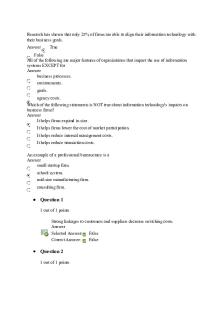Chapter 3 Answers PDF

| Title | Chapter 3 Answers |
|---|---|
| Author | Tyler Vaught |
| Course | Operating Systems |
| Institution | Western Governors University |
| Pages | 3 |
| File Size | 86.5 KB |
| File Type | |
| Total Downloads | 62 |
| Total Views | 349 |
Summary
Section 3 3 What are the four components of a process? Stack, heap, data and text 3 Provide at least three possible states a process may be in. New Running Waiting Ready Terminated 3 What is a Process Control Block (PCB)? A process represented in an operating system- also called task contr...
Description
Section 3.1 3.1 What are the four components of a process?
Stack, heap, data and text 3.2 Provide at least three possible states a process may be in.
New Running Waiting
Ready Terminated
3.3 What is a Process Control Block (PCB)? A process represented in an operating system- also called task control block. Contains may pieces of information such as process state, program counter, CPU registers, CPU scheduling information, memory management information, Accounting information, I/O status information. 3.4 What is another term for process? Job 3.5 True or False? Most operating systems allow a process to have multiple threads. TRUE Section 3.2 3.6What is the role of the process scheduler?
To switch the CPU among processes so frequently that users can interact with each program while it is running – selects an available process for program execution on the CPU. 3.7What is the degree of multiprogramming? The number of processes in memory- controlled by the long term scheduler. 3.8 What is the term that describes saving the state of one process, and restoring the state of another? Context switch 3.9 What is the term that describes saving the state of one process, and restoring the state of another? Context switch Section 3.3 3.10 What is a process identifier (PID)?
A unique identifier used in most operating systems to identify processes – typically an integer number. 3.11 What system call creates a process on UNIX systems?
fork() 3.12 What system call creates a process on Windows systems? CreateProcess() 3.13 What system call terminates a process on UNIX systems? exit() 3.14 What is the name of the process that UNIX and Linux systems assign as the new parent of orphan processes? init Section 3.4 3.15 What are the two fundamental models of interprocess communication?
Independent & Cooperating 3.16 What are the two system calls used with message-passing systems? send() & receive() 3.17 True or False? Message passing is typically faster than shared memory. Message passing systems are typically implemented using system calls and require the more time consuming task of kernel intervention. 3.18 How must shared memory behave for a rendezvous to occur? When both send() and receive() are blocking Section 3.5 3.19 What system call is used to create a POSIX shared memory object?
shm_open() 3.20 What system call is used to configure the size of a POSIX shared memory object? ftruncate() 3.21What term does Mach use to describe mailboxes? Ports 3.22What system call does Mach use to create a new mailbox? port_allocate()
3.23What term does Windows use to name its message passing facility? Advanced Local Procedure Call (ALPC) Section 3.6 3.24 Provide at least two types of communication mechanisms in client-server systems.
Sockets Remote procedures calls (RPCs) Pipes
3.25 TCP sockets are (a) connection-oriented or (b) connection-less? Connection-oriented 3.26 UDP sockets are (a) connection-oriented or (b) connection-less? Connection-less 3.27
abstract procedure calls for use between systems with network connections.
RPC 3.28 What is parameter marshaling? Involves packaging the parameters into a form that can be transmitted over a network. 3.29 What are the two types of pipes? Ordinary pipes & named pipes...
Similar Free PDFs

Chapter 3 answers
- 13 Pages

Chapter 3 answers
- 19 Pages

Chapter 3 Answers
- 3 Pages

Chapter 3 answers - sdaffthyj
- 19 Pages

chapter 3 quiz answers
- 4 Pages

Chapter 3 Quiz & Test Answers
- 2 Pages

Chapter 10-3 - Testbank Answers
- 11 Pages

Chapter 3 Lecture QUIZ - Answers
- 5 Pages

Tutorial 3 Chapter 7 answers
- 6 Pages

3-3 Short Answers
- 1 Pages
Popular Institutions
- Tinajero National High School - Annex
- Politeknik Caltex Riau
- Yokohama City University
- SGT University
- University of Al-Qadisiyah
- Divine Word College of Vigan
- Techniek College Rotterdam
- Universidade de Santiago
- Universiti Teknologi MARA Cawangan Johor Kampus Pasir Gudang
- Poltekkes Kemenkes Yogyakarta
- Baguio City National High School
- Colegio san marcos
- preparatoria uno
- Centro de Bachillerato Tecnológico Industrial y de Servicios No. 107
- Dalian Maritime University
- Quang Trung Secondary School
- Colegio Tecnológico en Informática
- Corporación Regional de Educación Superior
- Grupo CEDVA
- Dar Al Uloom University
- Centro de Estudios Preuniversitarios de la Universidad Nacional de Ingeniería
- 上智大学
- Aakash International School, Nuna Majara
- San Felipe Neri Catholic School
- Kang Chiao International School - New Taipei City
- Misamis Occidental National High School
- Institución Educativa Escuela Normal Juan Ladrilleros
- Kolehiyo ng Pantukan
- Batanes State College
- Instituto Continental
- Sekolah Menengah Kejuruan Kesehatan Kaltara (Tarakan)
- Colegio de La Inmaculada Concepcion - Cebu





